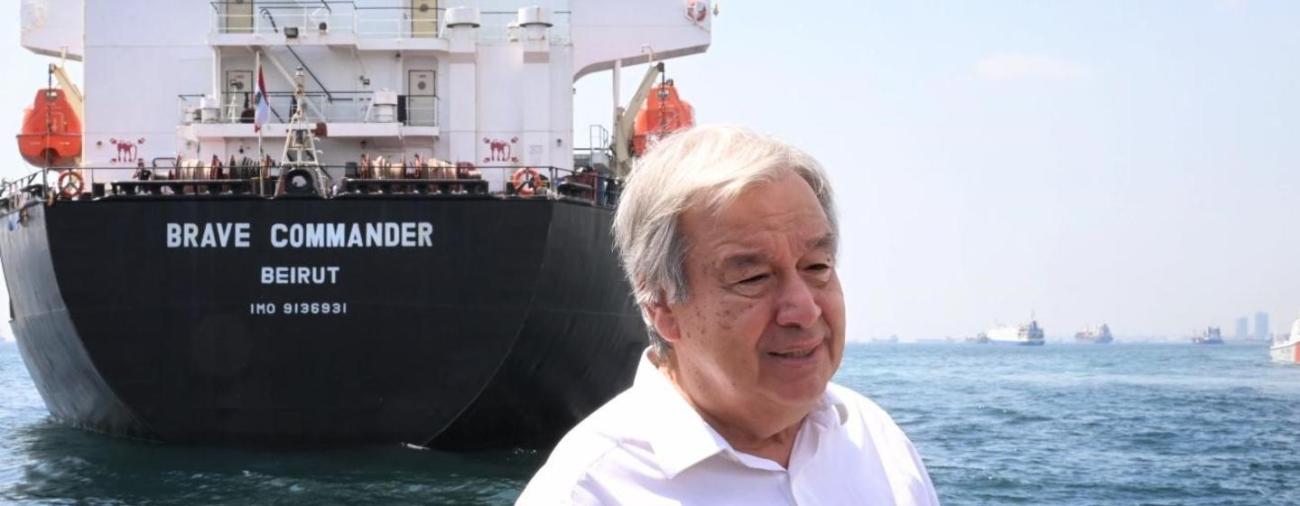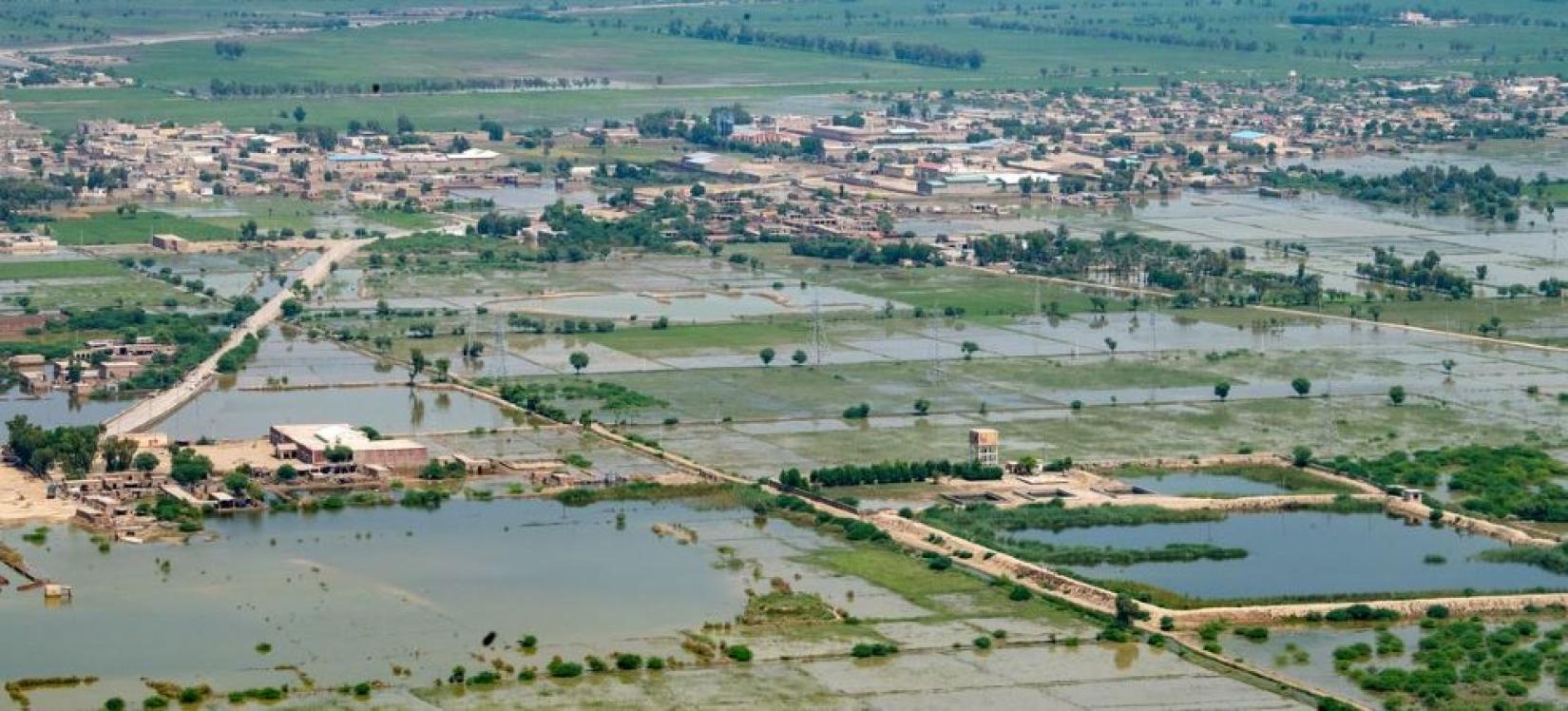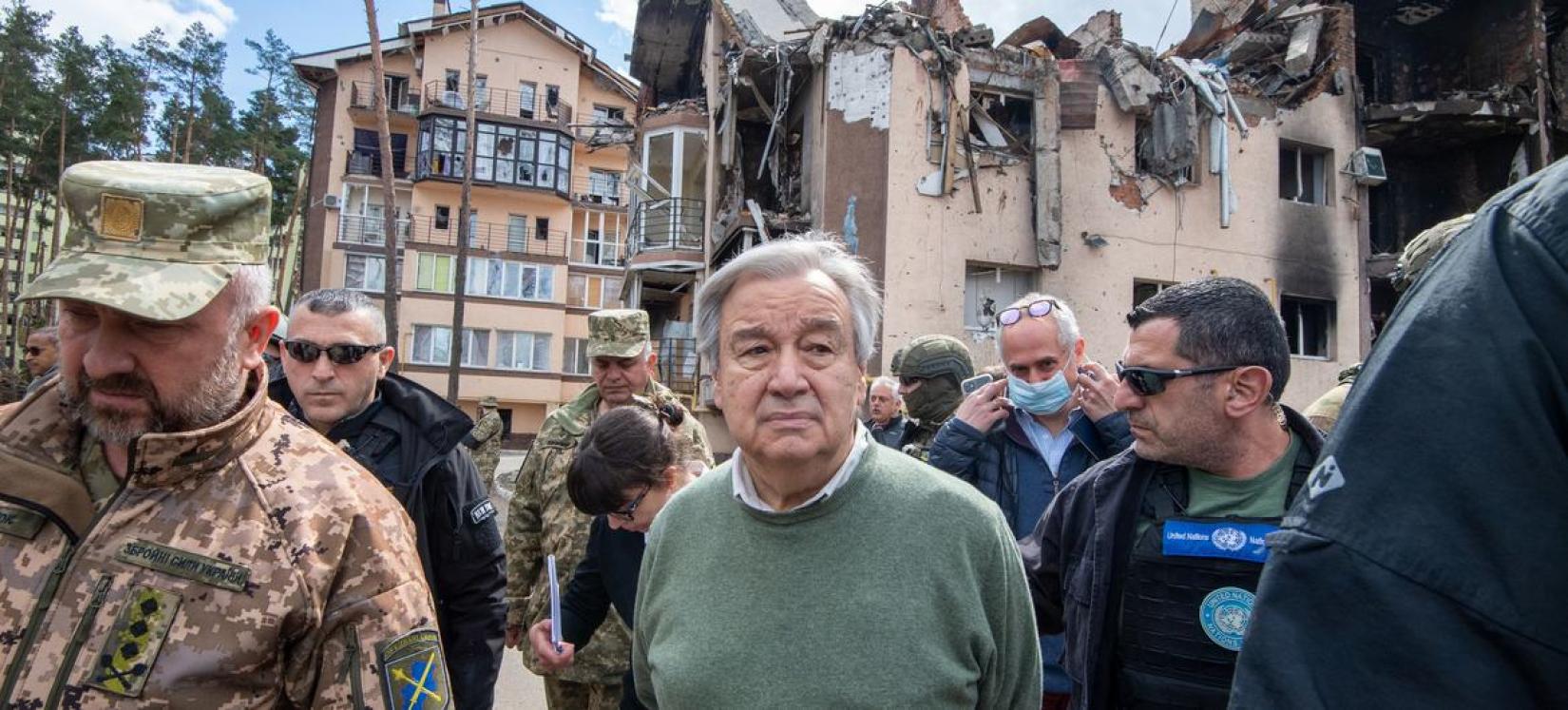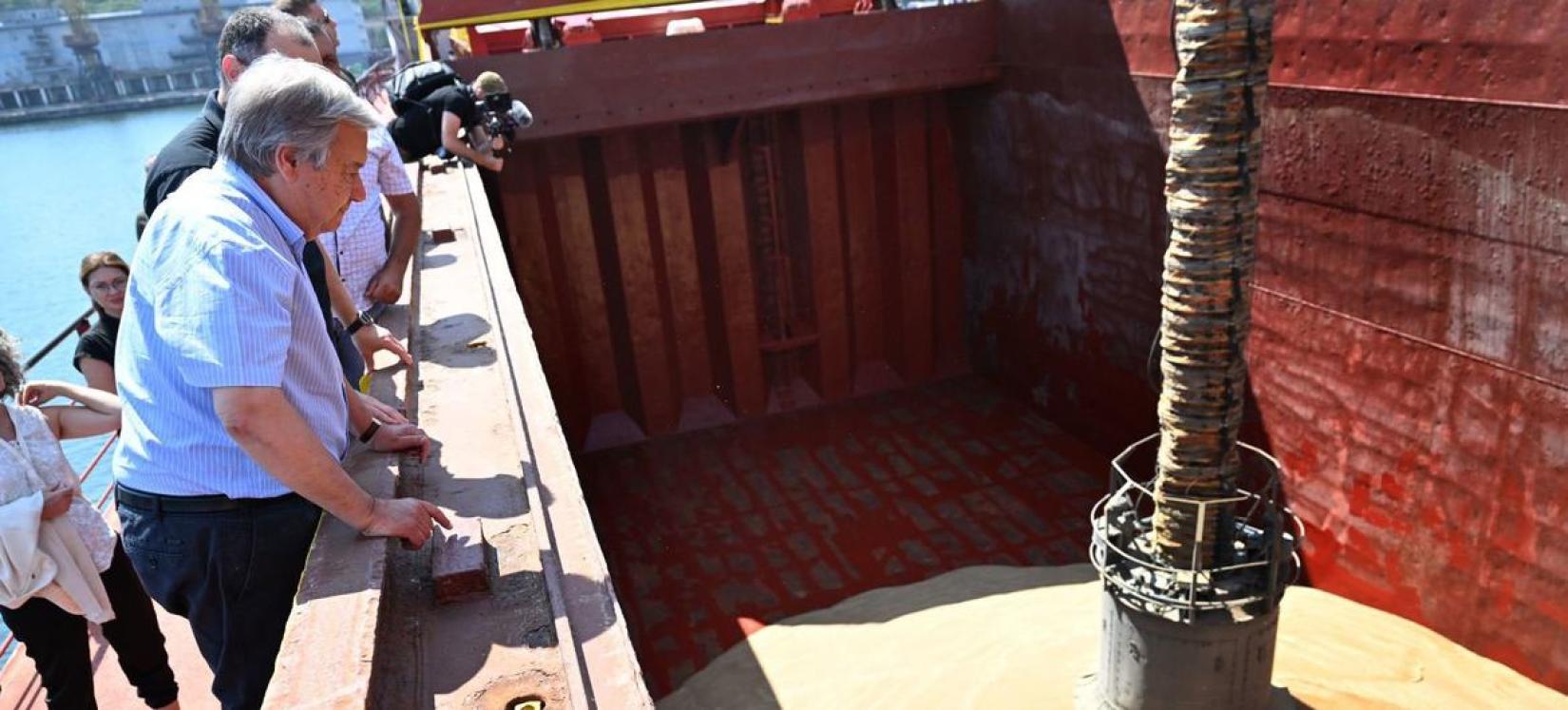INTERVIEW: Guterres calls for course correction to end geopolitical divisions, tackle climate crisis

In an interview with UN NEWS, UN Secretary-General António Guterres called for strengthened international solidarity to address a raft of global challenges.
“My objective is to make it clear that …we need cooperation, we need dialogue, and the present terrible geopolitical divides are not allowing it to happen. We need to change course,” Mr. Guterres said in a wide-ranging interview with UN News ahead of the General Assembly’s annual high-level week.
The UN chief is just back from a solidarity visit to flood-ravaged Pakistan, where he called repeatedly for fast – and serious – to not only end what he called “climate carnage” but to provide more support for the countries that are the most-impacted but have done very little to cause the phenomenon.
He told UN News: “We need to increase support to developing countries, not only in the reduction of emissions, but in building resilience, in building the sustainable infrastructure that is necessary for those countries to be able to [withstand] the impacts that are already devastating them. Most of the [climate] hotspots in the world [are] countries that did not contribute in a meaningful way to climate change.”
On the geopolitical front, the Secretary-General stressed the need for more dedicated and tactful diplomacy to effect demonstrable change on tough issues, including the global food shortages that have been sparked by Russia’s invasion of Ukraine.
Using the UN-brokered Black Sea Grain Initiative as an example, the UN chief said: “This has demonstrated that discreet diplomacy is still able to achieve what megaphone diplomacy does not. This agreement would not have been possible if we had not worked persistently to get it done with discretion, avoiding the creation of situations in which inevitably both parties start to fight each other.”
The interview has been edited for clarity and length.
UN News: You’ve just returned from Pakistan where you visited areas hit by climate-related disaster. We are now alarmed at the drought and possibility of famine threatening Somalia. What do you want to say to those who still deny that climate change is real – do we not ignore it at our peril?
António Guterres: Well, climate change is the defining issue of our time. And I’m extremely worried because with the war in Ukraine and several other events, climate change seems to have moved out of the priorities for many decision makers around the world, and this is suicide. We see emissions growing and we see fossil fuels becoming fashionable again [even though] we know that fossil fuels are the main [cause] for the progressive war against nature that we have been waging throughout our history.

It is absolutely essential to reduce emissions now. And unfortunately, while we should be able to reduce 45 per cent of the emissions [by] 2030, we are [instead facing] an increase in emissions [by] 14 per cent in 2030. So, we absolutely need to reverse this trend. We are heading into a catastrophic situation, and we have not much time to turn things around.
And at the same time, when we look at Pakistan, the level of destruction and the area flooded is three times the [size] of my country [Portugal]. We need to increase support to developing countries, not only in the reduction of emissions, but in building resilience, in building the sustainable infrastructure necessary for those countries to be able to [withstand] the impacts that are already devastating them. Most of the [climate] hotspots in the world are countries that did not contribute in a meaningful way to climate change.
UN News: Every year, we usher in a new session of the General Assembly, often seen as a highlight of the year for the United Nations. What is your focus for this year’s GA, the first since the pandemic when we are meeting in person and with a major war in Europe drawing attention away from other global priorities?
António Guterres: My objective is to make it clear that the geopolitical divisions we are witnessing today are terrible. When the world is facing climate change, when the world is facing the possibility of other pandemics and COVID-19 has not yet been resolved, when the world is facing high levels of inequality between developed and developing countries, and huge inequality within countries. The world needs to really turn around on all these aspects. We need unity, we need cooperation, we need dialogue, and the present geopolitical divides are not allowing it to happen. We need to change course.

UN News: The war in Ukraine has triggered one of the fastest and largest refugee crises in history. Kyiv [the Ukrainian capital] was bombed while you were visiting the country. How does this crisis differ from many others that you’ve seen as a High Commissioner and later as UN Secretary-General?
António Guterres: Most of the crises I have witnessed are in developing countries, relatively poor countries, and most of them are internal, even if there is an intervention [by] external powers. They became civil wars or [were] terrorist activities inside the country. Now we have a war between one superpower and Ukraine, which is also a modern country. And we are talking about levels of devastation that are not possible in situations where the nature of the armaments and the military capacity are completely different.
So, this is indeed once again a war between two states, created by the invasion of one state by another, with levels of armament and levels of force mobilization that are unparalleled in recent times. On the other hand, we are witnessing the fastest movement of refugees and displaced persons in recent history, with terrible humanitarian consequences.
UN News: You are hosting a major gathering to look at transforming education which has suffered in so many countries. You are keen to find responses to the economic slowdown that has seen a massive decline in progress with sustainable development. Amid major geopolitical tensions, what is your best-case scenario to make progress on these fronts?
António Guterres: If I had to choose one thing to improve the world situation [and] peace and security, that thing would be education. If I had to choose one thing to improve the capacity of understanding of climate change and the response to climate change, that would be education. When I look to anything that could reduce inequalities in the world, that thing would be education. But unfortunately, we are seeing, with the dramatic situation that we have in the world today – the war on climate, pandemics – we are seeing education budgets being reduced.
And so, the summit on [transforming] education is a moment to mobilize the whole international community to make countries understand that they need to invest much more in education, and to make developed countries understand that they need to amplify, together with international financial institutions, the support to developing countries for them to be able to invest in education.
We have launched the International Finance Facility for Education with Gordon Brown, and my hope is that this facility will be quickly funded by all donors in order to really make a difference for the most vulnerable populations in the world.

UN News: The Black Sea Grain Initiative has already seen almost three million tonnes of food from Ukraine leave for destinations across the world, helping alleviate the food crisis and saving lives. What are some of the essential components of this success story? How optimistic are you that this formula could be applied to other complicated situations?
António Guterres: This has demonstrated that discreet diplomacy is still able to achieve what megaphone diplomacy does not. This agreement would not have been possible if we had not worked persistently to get it done with discretion, avoiding the creation of situations in which inevitably both parties start to push back against each other. And this is, I would say, the recipe for many of the crises in the world. Let’s do everything possible to reestablish the importance of discreet diplomacy in crisis solution in today’s world.
UN News: Human rights are one of the pillars of the UN’s work. You have flagged the dangers posed by rising hate speech, xenophobia and populist nationalism. Why is this happening, and what – on the other hand – gives you hope?
António Guterres: Well, these things have always existed, but they are now immensely amplified by social media and by all the [information technology] platforms that exist around the world.
On the other hand, when countries have difficulties in solving their problems, nationalism, xenophobia, making scapegoats, and [targeting] foreigners are unfortunately some of the things that are becoming more and more frequent. We need to understand that human rights must unite – unite communities, unite countries. Racism and xenophobia are two absolutely unacceptable manifestations of hatred that we need to... eliminate in our world.
UN News: For a long time, you have been expressing concerns over the reality that the world becoming more polarized, what you’ve called the ‘great fracture’. As Secretary General, it is obvious that this political reality makes your job more difficult. What can you do to bring the world together?
António Guterres: I do not have the power to make miracles. What we can do is to be determined to use as much as possible the instruments at our disposal – good offices, mediation – and do everything we can to make the world understand that the enormous challenges that we face can only be addressed with solidarity, cooperation and unity.
UN News: This time last year, COVID-19 seemed to be the biggest global crisis we were all living through, impacting the General Assembly and the UN’s operations. What should governments and the UN be doing to keep public health high on the agenda?
António Guterres: It is very important to solve the problems of [equitable distribution and availability of vaccines] where those problems still exist. This is something that the UN system is mobilizing behind. And second, it is absolutely essential to provide the countries that were impacted by COVID-19 – by the lockdowns, by the end of tourism, by many other aspects, and are today in a desperate situation, in a perfect storm, without fiscal space, with increased debt – mechanisms of debt relief, to have mechanisms of provision of liquidity to the developing countries that are more [stressed], including middle income countries, in order for them to be able to recover.
When we saw that the richer countries were able to print billions or even trillions to relaunch their economies, unfortunately, developing countries could not do the same... their currencies would, of course, go down the drain. So, international solidarity must be reestablished.
UN News: As you have begun your second term, how do you feel you would like to make the UN fit for purpose? What is the biggest reform you would like to see happen if you had your way?
António Guterres: We have launched Our Common Agenda, which is a series of projects, of ideas, of proposals, whose objective is to make the UN much more effective, and at the same time to reestablish multilateralism as the way to solve the world’s problems. My main objective is to [have] Our Common Agenda developed and adopted by Member States and to transform itself into the main instrument we have supporting the 2030 Agenda and the Sustainable Development Goals (SDGs) in order to be able to bring more peace, more development, more justice and the effective respect of human rights to the world.
UN News: Given your emphasis on gender parity and engaging youth, what will you do to ensure your legacy in this respect? Do you want to see a young female successor?
António Guterres: First of all, we have reached parity in relation to senior management of the UN, about 200 senior leaders. We have parity in the Resident Coordinators, which means the coordinators of the UN activities in the different countries of the world. And we are moving toward the objective of reaching parity in 2028 at all levels of the work of the United Nations.
On the other hand, we have been mainstreaming gender into all policies of the UN, into all the actions of all agencies, and in all the work that we do. About the Secretary-General, I'm sorry. I'm not a woman. But I of course, see, with a lot of interest and sympathy, the possibility to have women not only as Secretary-General of the United Nations, but as leaders of the most [influential] countries in the world.


















